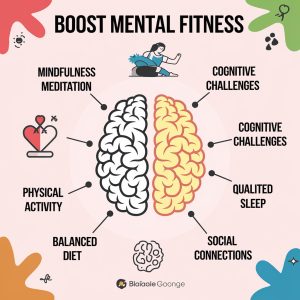Exercising Your Brain: 6 Powerful Strategies for Mental Fitness
Just as you train your body to stay strong, Exercising Your Brain is essential for maintaining sharpness, resilience, and cognitive agility. Mental fitness focuses on improving your thinking abilities, reducing stress, and fostering a positive mindset.
Learn more about mental fitness techniques (Outbound link to a relevant mental health resource).
1. Practice Mindfulness Meditation for Mental Clarity
How Mindfulness Enhances Brain Health
Exercising Your Brain with mindfulness meditation strengthens your ability to process emotions, enhances focus, and reduces stress.
Read more on mindfulness practices (Outbound link to an authoritative mindfulness resource).
Steps to Start Mindfulness Meditation
- Dedicate 10-15 minutes daily to focus on your breath.
- Release distractions to build mental clarity and emotional balance.
2. Engage in Cognitive Challenges to Sharpen Your Mind
The Role of Brain Challenges in Mental Fitness
Engaging in cognitive tasks is a core part of Exercising Your Brain. Activities like puzzles, chess, or learning a new language improve memory and enhance neuroplasticity.
Explore cognitive games for brain health (Outbound link to an external brain training resource).
Brain-Boosting Activities to Try
- Solve crossword puzzles or sudoku.
- Play strategy games like chess or Scrabble.
- Learn new skills or hobbies to stretch your mental muscles.
3. Maintain Physical Activity to Enhance Brain Power
Exercising Your Brain Through Physical Movement
Physical activity improves blood flow to the brain, strengthens memory, and supports problem-solving skills. Staying active benefits both your body and mind.
Find more on brain health and exercise (Outbound link to a trusted fitness and health resource).
Top Exercises for Brain Fitness
- Go for brisk walks or jogging to refresh your mental energy.
- Practice yoga to combine physical and mental fitness.
- Try aerobics or strength training to boost cognitive resilience.
4. Prioritize Quality Sleep for Brain Recovery
Why Sleep is Key to Exercising Your Brain
Adequate sleep is critical for memory consolidation, cognitive processing, and mental sharpness. Without it, your brain cannot function at its peak.
Learn more about sleep’s impact on the brain (Outbound link to a trusted sleep foundation).
Tips for Better Sleep and Mental Fitness
- Stick to a sleep schedule of 7-9 hours per night.
- Avoid screens before bedtime to improve sleep quality.
- Create a calming bedtime routine to aid brain recovery.
5. Nourish Your Brain with a Healthy Diet
How Nutrition Supports Exercising Your Brain
A brain-healthy diet fuels mental energy, enhances cognitive performance, and combats age-related decline. Foods rich in antioxidants and omega-3s are particularly beneficial.
Explore brain-boosting foods (Outbound link to an expert nutrition site).
Brain-Boosting Foods to Include
- Add leafy greens, berries, nuts, and whole grains to your meals.
- Eat fatty fish like salmon for omega-3 fatty acids.
- Stay hydrated and limit processed food consumption.
6. Cultivate Social Connections for Emotional and Mental Fitness
Social Engagement as a Form of Exercising Your Brain
Building positive relationships reduces stress, enhances mood, and strengthens cognitive function. Social interactions are key to maintaining mental resilience.
Learn more about social connections and brain health (Outbound link to a mental health resource).
Ways to Build Positive Social Connections
- Spend quality time with family and close friends.
- Join community groups or take part in local events.
- Volunteer to foster meaningful connections and emotional fulfillment.
Why Exercising Your Brain is Vital for a Resilient Mind
Regularly Exercising Your Brain helps combat age-related cognitive decline, improves focus, and enhances overall mental fitness. By incorporating these strategies into your routine, you can ensure your brain stays strong and sharp throughout life.
Explore more brain fitness tips (Internal link to your own website for related articles on mental health and wellness).



